#pompeius magnus
Text
It's the late Roman Republic...
Now put in the tags what you selected and who you THINK it's referring to... Because I sneakily had at least two people in mind when I made each option and when the poll is over I'll reveal who I had in mind for each option
#roman history#ancient rome#roman empire#how often do you think about the roman empire#ancient history#julius caesar#pompey#augustus#pompeius magnus#caesar#the roman empire is my roman empire#lucullus#crassus#Marius#gaius marius#marian reforms#sulla#pompey the great#mark antony#brutus#Hamilton#and peggy#lepidus#marcus agrippa#sextus pompey#octavian#the Gracchi#Gracchi brothers
135 notes
·
View notes
Text
Okay of these three characters (all historical and real) who would you most be interested in reading novel/s about?
Pompeius Magnus - rule breaker, golden boy, literally the most likable guy, builder of great buildings and most successful general ever pretty much. He also respects women which is just unheard of in his day to the point people make fun of him for it. He's also got a lot of tragedy and loss and the most poignant and cinematic death in all of history
Sextus Pompeius - "pirate", rebel, heart of absolute gold, honorable even to the people who deserve it least. Savior to hundreds, lord of Sicily. Dutiful son of a slain father. Also experiences a lot of loss. The last resistance to the totalitarian triumvirs. Very successful against them for years and largely forgotten by history. He was given the libelous title of "pirate king" but that just makes him sound cooler if you ask me
Pompeia Magna - fatherless at age six, tumultuous childhood that ends with her being put in the care of her uncle (this is where history ends and my made up story for her begins) used as a pawn to curry favor with a man she despises who was responsible for the ruin of her family, proud in spite of her humiliation. Taken under the wing of the "empress" who knew her as a child. She brushes shoulders with some of the big names of her day including the eventual successor to the governing of the empire. Without any true family to guard and protect her she is both more exposed to danger but also capable of more freedom of movement. She navigates the deadly waters of Rome to outlive all her enemies and see the men who put her in harms way brought to justice and to finally achieve her lifelong goal of living in security on her family's ancestral lands
Definitely put any further thoughts in the comments and tags
#roman history#ancient rome#roman empire#how often do you think about the roman empire#ancient history#pompey#pompeius magnus#sextus pompey#julius caesar#augustus#marcus agrippa#marcus antonius#mark antony#pompeia#livia#livia drusilla#Pompeia magna#rome#romans#historical fiction#historical novels#the roman empire is my roman empire
13 notes
·
View notes
Text

WILL NO ONE RID ME OF THIS TROUBLESOME PRIEST ROMAN?
When Caesar arrived in pursuit on the third day, Theodotus showed him Pompey's head and ring, but Caesar was offended and wept.
-Liv. Per. 112.4
the title quotation is referring to the famous quote associated with the henry II-thomas becket conflict. the uhhhhh. the themes match, somewhat. feels the same, in some kind of way. anyway, fucking RIP to caesar and pompey. it's gotta be lonely, to start off as three, and then two, and even locked in conflict, there's a familiarity of being known that you're never going to have again. ah, what loss. what tragedy. etc etc etc.
#the queen must bury the king. long live the queen or whatever. im not a monarchist. stab the queen. long live the conspirators#gaius julius caesar#gnaeus pompeius magnus#drawing tag#komiks tag#roman republic tag#im gonna be real with you all. there is some kind of king herod being presented with the head of john the baptist going on in here#imagery wise.#CHRIST what was the hbo rome line. HE WAS A CONSUL OF ROME! there it is. god what delivery.#i almost made that the quote but i dont actually want to quote hbo rome if i can quote literally ANYTHING else#tris homines
1K notes
·
View notes
Text

pompey and cicero making out sloppy style in the senate. is this anything
#dykepulpfriction#my art#pompey#cicero#late roman republic#roman republic#roman history#old man yaoi#rome#ancient rome#gnaeus pompeius magnus#marcus tullius cicero#queer love#lmaooo
250 notes
·
View notes
Text
I cannot perceive the word sexting the expected way, because every time I envision "You have my father's house, Antony" in, like, grindr messages.
240 notes
·
View notes
Text
Brutus joins Pompey, the murderer of his father
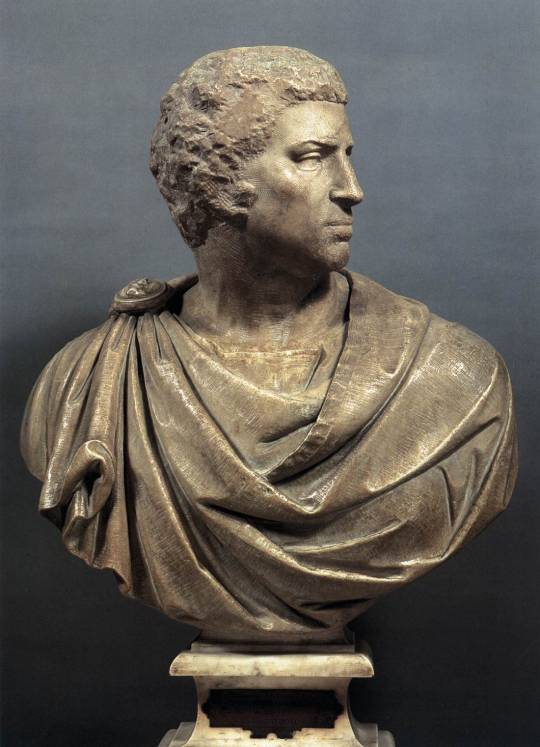
"Upon the general separation into two factions, when, Pompey and Caesar taking up arms against one another, the whole empire was turned into confusion, it was commonly believed that he would take Caesar's side; for his father in past time had been put to death by Pompey. But he, thinking it his duty to prefer the interest of the public to his own private feelings, and judging Pompey's to be the better cause, took part with him; though formerly he used not so much as to salute or take any notice of Pompey, if he happened to meet him, esteeming it a pollution to have the least conversation with the murderer of his father. But now, looking upon him as the general of his country, he placed himself under his command, and set sail for Cilicia in quality of lieutenant to Sestius, who had the government of that province. But finding no opportunity there of doing any great service, and hearing that Pompey and Caesar were now near one another and preparing for the battle upon which all depended, he came of his own accord to Macedonia to partake in the danger. At his coming it is said that Pompey was so surprised and so pleased that, rising from his chair in the sight of all who were about him, he saluted and embraced him, as one of the chiefest of his party." ~Plutarch's Life of Brutus
#brutus#marcus brutus#marcus junius brutus#ancient rome#the conspirators#roman republic#roman history#roman empire#rome#gaius julius caesar#julius caesar#pompey#gnaeus pompeius magnus#plutarch#quotes#ides of march
69 notes
·
View notes
Text
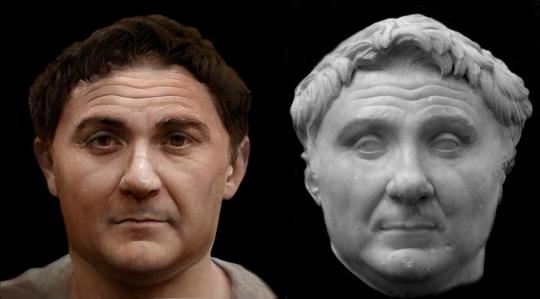
28 September 48 BC: Gnaeus Pompeius Magnus, in English known generally as Pompey, was killed in Egypt.
Here is the modern reconstruction of what he could have possibly looked like based on one of his portraits.
#ancient rome#pompey#gnaeus pompeius magnus#first triumvirate#late roman republic#he looks nice#but they did use to call him the boy butcher
23 notes
·
View notes
Text
So, regarding the debate on the date of issue of this Pompey aureus, I've collected the arguments for the different proposed dates (aka the dates of Pompey's triumphs) because well, it's interesting!
Usually, the arguments are based on 3 clues:
the head of Africa
the inscriptions "Magnus" and "proconsul"
Gnaeus being represented
DATE OF ISSUE: 81-79 BC (first triumph)
Supported by: Mommsen
The head of Africa relates to, well, Pompey's victories in Africa
Pompey had already been acclaimed "Magnus" by his soldiers and possibly liked it very much :)
[ This goes against Plutarch's statement that Pompey only started using "Magnus" in the Sertorian war ]
Although Pompey was granted the title "proconsul" only three years later, "propraetor" and "proconsul" are basically the same titles with only a difference in prestige
[ These arguments are summarized in Coins of the Roman Republic in the British Museum book (1910) where Grueber disagrees with Mommsen's theory on the basis that it "would have been an act of supreme arrogance" for Pompey to call himself a proconsul ]
DATE OF ISSUE: 71 BC (second triumph)
Supported by: Cavedoni (1831?), Crawford (1974), and the British Museum
cf Crawford's arguments in the original post
[ The BMCRR book finds it unlikely on the basis that Pompey shared this triumph with Metellus Pius and that Metellus doesn't seem to have issued his own coins ]
DATE OF ISSUE: 61 BC (third triumph)
Supported by: Eckhel (1798), Lenormant (1975), the CRRBM book (1910), Sydenham?
Lenormant's argument: Pompey was only proconsul in the war against the pirates and Mithridates + Gnaeus's presence hints towards the wars in Asia (which he apparently participated in (??))
Gnaeus being born in 80-76 BC and the first campaign in which he took part having been against the pirates in 67 BC, he could not have appeared on a coin issued in 81 BC and the BMCRR finds it unlikely for him to appear on one issued in 71 BC
The head of Africa is a callback to the title "Magnus", not so much to the campaign itself
(Additionally the book argues that the coin must have been struck in the East because its quality resembles that of Sulla's coins in the East)
Crawford arguing for 71 BC means Gnaeus would have been 5-9 yo for this triumph. For comparison, Marius's son appears as rider on a denarius issued for his father's triumph, and he would have been 8 at the time. Additionally, I may be wrong but I don't believe children had to have participated to their father's campaign for them to appear in the triumph?
Haven't found how to access the other references listed by the Brit Museum besides the BMCRR book (which provides a very long argumentation) and Crawford, but I'll edit the post if I find anything new for these three dates.
Now, I've kept it for the end because it's a little out of pocket but also kinda fascinating, but this article from 1963 by Harold Mattingly argues that the aureus wasn't issued for any of the three triumphs. His arguments are the following:
The strange choice of Africa for 61 BC
The absence of signature from the moneyer
The "proconsul" inscription
Instead, he suggests that the coin may have been issued during the civil war, paralleling the ones issued by Caesar and spiting him with the "proconsul" inscription (aka a magistracy that had been approved by the Senate). The head of Africa would relate to the African campaign of Cato and Scipio, meaning the coin would have been issued on their order after Pompey had already been killed. I don't know how likely this hypothesis is but I do like how it ties with some analysis I've read of the decisions made by Scipio (and to a much lesser extent Cato) like sending Gnaeus to Spain rather than other commanders so he could benefit from the Pompeius name.
#the romanity#pompey magnus#gnaeus pompeius jr#and uh#coins#well that's a niche post if i've ever made one#long post#?#my posts
10 notes
·
View notes
Text
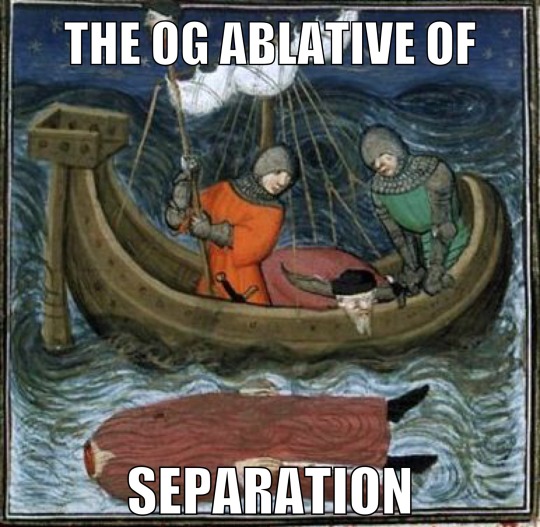
rip pompey u will be missed :’(
#more advanced latin memes#this part was rly profound but it did use an ablative of separation so i had to#lucanposting#pharsalia#bellum civile#jackassery#tagamemnon#lucan#gnaeus pompeius magnus#pompey the great#latin memes#ablative memes
255 notes
·
View notes
Text
Gladius
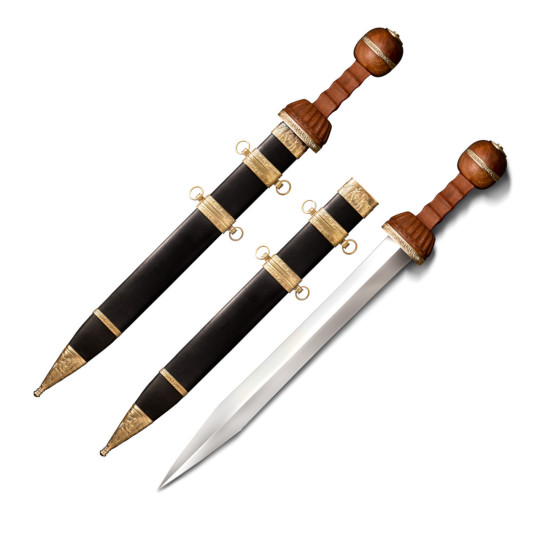
The Roman gladius was a short stabbing sword that has been used to kill both opponents and dissidents throughout the history of the world. The length of the sword has varied between 60-85 centimeters. The shape has remained largely the same. The shape of the blade has been narrower in the middle in older models. The first swords were made of bronze due to the lack of iron. the Gallic warriors were the first to use the gladius sword. The gladius sword was a noble weapon equipped with every soldier's shoulder harness.
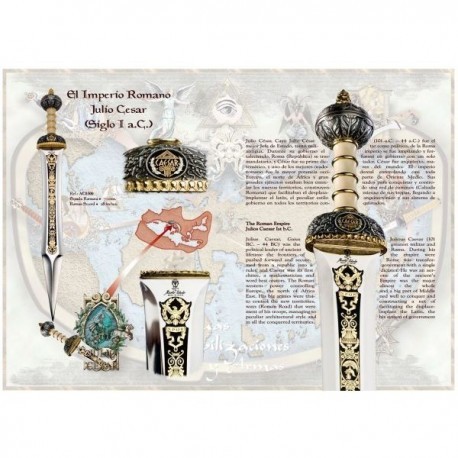
Gladius on tehnyt vuosisatojen aikana vähintäänkin yhtä kovaa tuhoa primitiivisellä tavalla, kuin kalashnikov nykypäivänä. Gladius eli miekka latinaksi oli lyhyt miekka. Se oli tehty lähitaisteluun ja etenkin pistämistä varten. Nopea ja uppoava terä oli vastustajan kaulan puhkeamiseen kallisarvoinen työkalu.
Gladius oli 60-85 cm pitkä ja kapea osittain myöhemmissä malleissa miekan muoto oli enemmän soikeampi ja keskeltä oheneva. Miekka kulki olkapäiltä ulottuvalla nahkavyöllä. Gladius oli sotilailla aina lyhyen tikarin pugion kanssa.
Lyhyt miekka on peruja falcatasta, josta Aleksanteri Suuri teki tunnetun. Gladiuksen tunnettuja käyttäjiä olivat Julius Caesar ja Gnaeus Pompeius Magnus.
#mikamikapodcast#podcast#suomeksi#suomitumblr#julius caesar#gnaeus pompeius magnus#gladius#sword#italy
1 note
·
View note
Text
If you were going to pin the BEGINNING of the downfall of the Roman Republic on the actions of one Roman
#roman history#ancient rome#roman empire#how often do you think about the roman empire#ancient history#julius caesar#pompey#caesar#pompeius magnus#the roman empire is my roman empire#gaius gracchus#gaius julius caesar#gaius marius#marian reforms#tiberius gracchus#the gracchi#sulla#lucius cornelius sulla#marcus licinius crassus#crassus#Pompey the great#i will cry over every vote for Pompeius
143 notes
·
View notes
Text
ISO
I ALMOST did it. I almost took the lazy modern way and just downloaded an AI art app and told it what I wanted. But I won't do it. Making a difference and saving art means not being lazy or cheap.
So with that said I know theres a lot of art blogs I follow and who follow me and all that good stuff so if anyone thinks they would be up for the challenge of illustrating some historical figures for me I'd be very happy to see some examples of your art style and if it's what I'm looking for and come to an agreement on commissions and stuff.
Namely I need Pompeius Magnus in the style of a Lee Pace looking dude... So give me Lee Pace with gingery curls in a toga or Roman general's uniform basically
#iso art#art#anti ai#no ai art#support the artist#Pompeius Magnus#Pompey the great#Pompey#art iso#illustrations#roman art#ancient rome#how often do you think about the roman empire#the Roman empire is my Roman empire#lee pace#toga#roman generals#alexander the great
6 notes
·
View notes
Text
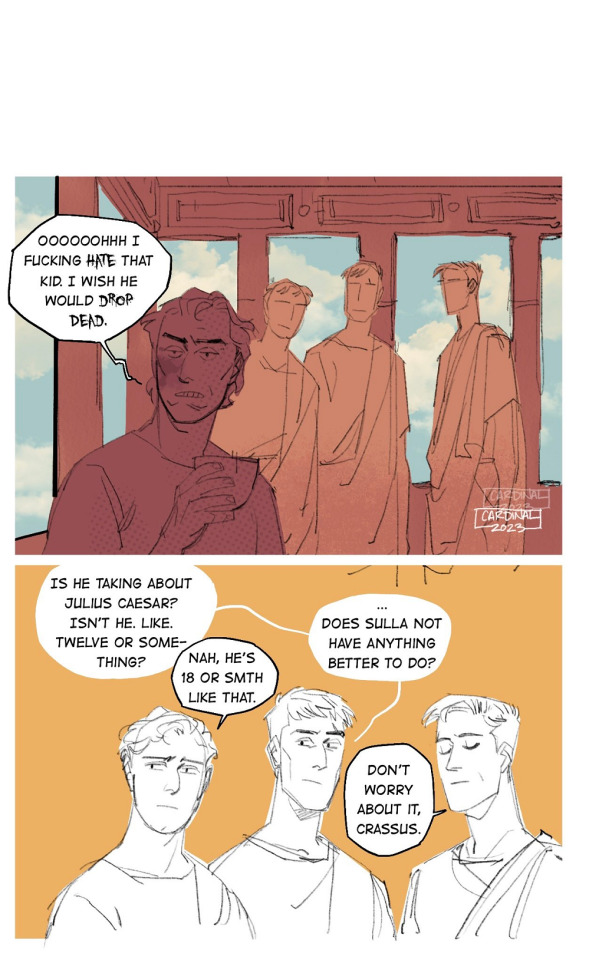
Moreover, Caesar was not satisfied to be overlooked at first by Sulla, who was busy with a multitude of proscriptions, but he came before the people as candidate for the priesthood, although he was not yet much more than a stripling. To this candidacy Sulla secretly opposed himself, and took measures to make Caesar fail in it, and when he was deliberating about putting him to death and some said there was no reason for killing a mere boy like him
Plutarch, Caesar
sulla's fight with caesar is extremely funny, but also very Something considering how much of sulla you see reflected in caesar's later actions. breaking news: grown man picks fight with teenager, more at 11.
bsky ⭐ pixiv ⭐ pillowfort ⭐ cohost
#roman republic tag#drawing tag#komiks tag#ehgugh. okay.#hello late republic it has been. like. a week since you've appeared on my blog.#i had to dig through my other WIP folder which is just goofy comics i draw to amuse myself. which is what this is#the third guy is lucullus bc im still testing out designs. someday i will land on one i like.#my main WIP folder was just making me sad so we'll put that to the side for now and focus on making. coffee#i need to be awake before i attempt to try and read this one book and man i do not feel awake in the slightest#lucius cornelius sulla felix#lucius licinius lucullus#gnaeus pompeius magnus#marcus licinius crassus
463 notes
·
View notes
Text
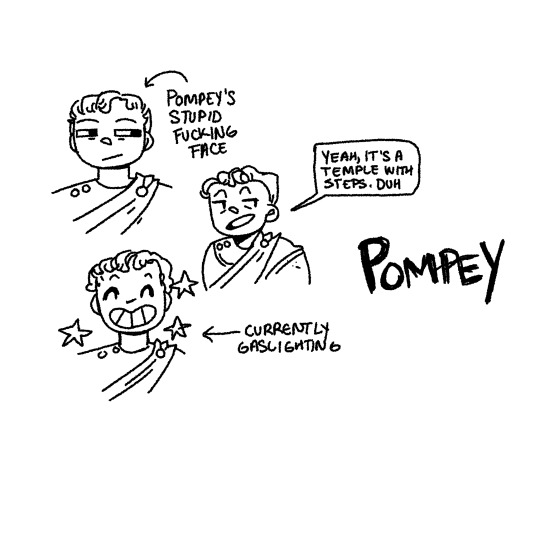
fuck it. pompey doodles
#dykepulpfriction#dykepulpfriction art#art#my art#tagamemnon#pompey#roman republic#ancient rome#gnaeus pompeius magnus#rome#romeposting#late roman republic#ancient history#doodles#shitpost
61 notes
·
View notes
Text
Facts about Pompey:
Eel.
Bites.
Licking Sulla's sword.
Epic custody battle for Sulla's children.
Told to go die by his own daughter, in homeric verse.
Loves to divorce people.
Cannot divorce Crassus (legally you cannot divorce a ghost).
Built a haunted boat.
Made his personal rostra at home.
It is cool when in opera he gets arias about ships.
85 notes
·
View notes
Text
Pompey the Great assassinated, September 28th, 48 BC
Upon landing in Egypt, Roman general and politician Pompey is murdered on the orders of King Ptolemy of Egypt.
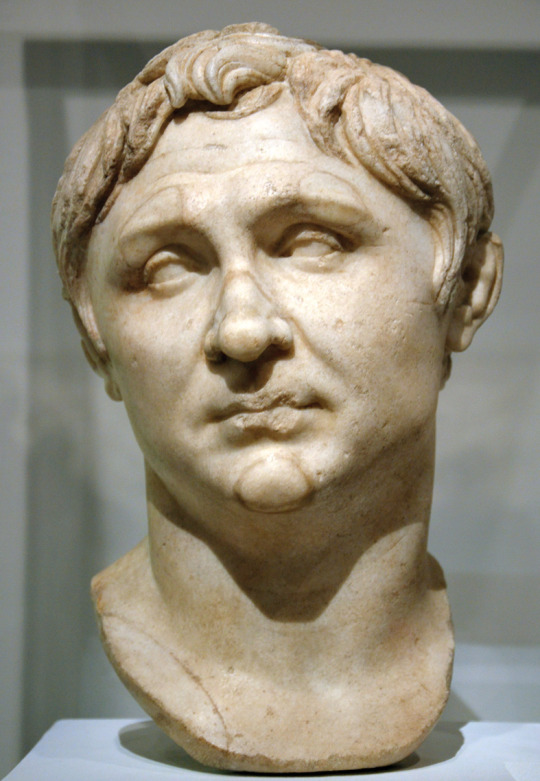
During his long career, Pompey the Great displayed exceptional military talents on the battlefield. He fought in Africa and Spain, quelled the slave revolt of Spartacus, cleared the Mediterranean of pirates, and conquered Armenia, Syria and Palestine. Appointed to organize the newly won Roman territories in the East, he proved a brilliant administrator.
In 60 B.C., he joined with his rivals Julius Caesar and Marcus Licinius Crassus to form the First Triumvirate, and together the trio ruled Rome for seven years. Caesar’s successes aroused Pompey’s jealousy, however, leading to the collapse of the political alliance in 53 B.C. The Roman Senate supported Pompey and asked Caesar to give up his army, which he refused to do. In January 49 B.C., Caesar led his legions across the Rubicon River from Cisalpine Gaul to Italy, thus declaring war against Pompey and his forces.
Caesar made early gains in the subsequent civil war, defeating Pompey’s army in Italy and Spain, but he was later forced into retreat in Greece. In August 48 B.C., with Pompey in pursuit, Caesar paused near Pharsalus, setting up camp at a strategic location. When Pompey’s senatorial forces fell upon Caesar’s smaller army, they were entirely routed, and Pompey fled to Egypt.
Pompey hoped that King Ptolemy, his former client, would assist him, but the Egyptian king feared offending the victorious Caesar. On September 28, Pompey was invited to leave his ships and come ashore at Pelusium. As he prepared to step onto Egyptian soil, he was treacherously struck down and killed by an officer of Ptolemy.
#pompey#pompey magnus#gnaeus pompeius magnus#first triumvirate#ptolemaic egypt#rome#ancient rome#roman republic#roman history#roman empire#julius caesar#gaius julius caesar#pompey the great#history#ancient history
20 notes
·
View notes